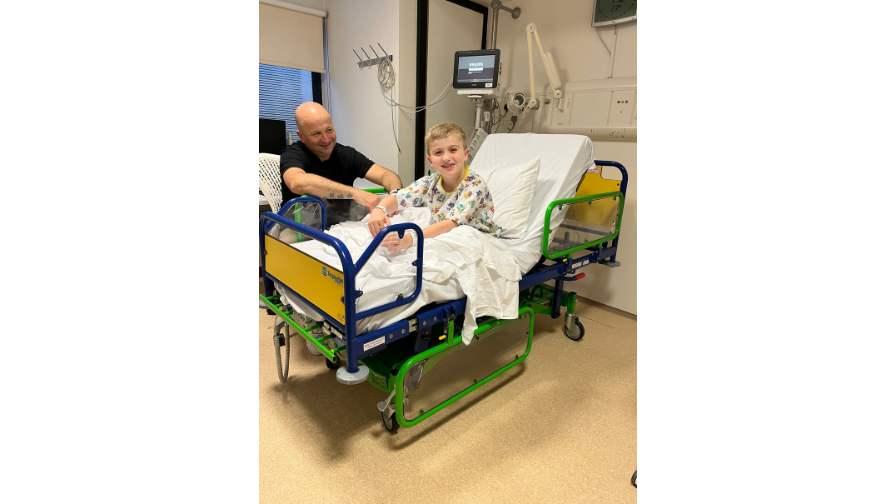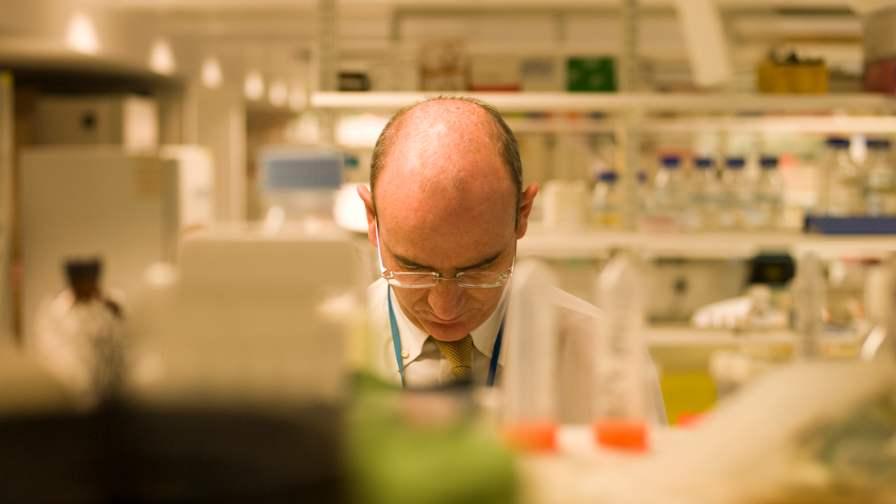Charities Action Medical Research and LifeArc are jointly funding research to find a new way to treat Duchenne muscular dystrophy (DMD), a serious life-limiting condition that causes progressive muscle weakness and for which there is no cure.[1]
Children with DMD have a faulty gene which means they do not make either enough, or any, of a protein called dystrophin, which is important for keeping muscles healthy. As a result, they will experience a range of debilitating symptoms that usually start in early childhood and gradually worsen over time.
Nine-year-old Digby Donnelly from Kent was diagnosed with DMD at the age of two. His mum, Lisa, says: “When Digby was two, I noticed that he wasn’t reaching his milestones: He waddled when he walked, couldn’t lift his neck properly and had to roll onto his tummy to sit up. One of my daughters, Matisse, was also experiencing muscle pain, so she had tests and was diagnosed as having the Duchenne gene. All the family then had genetic testing and Digby was diagnosed with Duchenne muscular dystrophy. Digby is nine now, but his level of understanding, behaviour and knowledge is like a four-year-old. The condition has had a big impact on all our lives. I had to give up work and we have had to renovate our house to accommodate his wheelchair and other equipment.”

New research, funded by Action Medical Research and LifeArc, is underway and could help children like Digby. Led by Professor Francesco Muntoni, at UCL Great Ormond Street Institute of Child Health, this research will investigate whether combining gene-based therapies with existing medications could improve their effectiveness.
The research will use an approach, called antisense oligonucleotides (AONs), which involves delivering tiny pieces of genetic material into muscle cells. These molecules are designed to bypass the effects of certain faults in the dystrophin gene, allowing the production of a functional version of the dystrophin protein. Although AONs show great potential, their effectiveness has been limited so far by the low levels of the protein produced in the muscle cells of people with DMD. By targeting this bottleneck with existing drugs at the same time, the team will investigate if this new combination therapy could have synergistic effects.
“Testing various combinations of AONs with existing medications on patient cells will enable us to determine which is the most effective at increasing dystrophin protein production. By focusing on therapies that are already in use or have undergone extensive clinical trials, the team hopes to accelerate the process of bringing the most promising treatment strategies to children with DMD,” says Professor Muntoni.

This research is needed as in the UK, about 100 boys are born each year with DMD and there is no cure. Most people with DMD only live into their 20s or 30s. Lisa says: “We know that time with Digby is precious, so we are creating memories for him to help us keep going when the condition gets worse. In Christmas 2024, thanks to the Muscle Help Foundation (MHF) charity, Digby had a one to one 30-minute video call with the comedian and MHF charity friend Harry Hill, which he loved. Digby was also treated to a ‘Muscle Dream Day’ by the MHF charity as a VIP guest on a cruise ship, where he met the captain and blew the ship’s horn. We are grateful to the research teams investigating new ways to treat Duchenne – this new research brings hopes to families like ours.”
Dr Caroline Johnston, Senior Research Manager at Action Medical Research, says: ”This research demonstrates Action Medical Research’s commitment to fighting for children’s lives through funding groundbreaking research to help find new treatments. Previous Action-funded research contributed to the development of AONs as a new class of genetic medicines which restore some function to the faulty dystrophin gene, to help children with DMD. This research will now look at using an additional approved medicine, in combination with AONs developed, to further boost dystrophin levels and develop a new treatment strategy for boys with DMD.”
Dr Karen Skinner, Chief Project and Portfolio Officer at LifeArc, adds: “Duchenne muscular dystrophy is a devastating condition. It robs children of their strength, their independence and, ultimately, their future. That’s why this research is so important. By building on what is already known and combining cutting-edge science with existing medicines, we hope that this research will fast-track better treatments for children like Digby.”
Learn more about Action’s work tackling rare diseases such as Duchenne muscular dystrophy: www.action.org.uk/rare.
Learn more about LifeArc’s mission: https://www.lifearc.org/translational-challenges/rare-disease/.
Reference
- NHS website, Muscular Dystrophy: https://www.nhs.uk/conditions/muscular-dystrophy/ [website accessed 8 May 2025]
